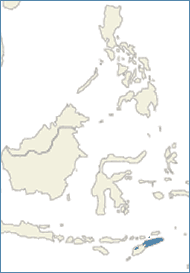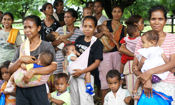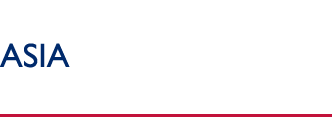 |
|
 |
 |
 |
| USAID Information:
External Links:
|
|
 |
 |
|
 |
 |
|
Timor-Leste

SNAPSHOT
Date of independence: 2002
Capital: Dili
Population: 1 Million (2006)
Income per person: $840
Source: World Bank Development Indicators 2007
USAID IN EAST TIMOR timor-leste.usaid.gov
CONTACTS
USAID Representative
Mark Anthony White
USAID Representative
Department of State/USAID
8250 Dili Place
Washington, D.C. 20521-8250
Desk Officer
Deanna Gordon Tel: (202) 712-0963
Email: degordon@usaid.gov

Timorese mothers and their children receive insecticide-treated bed nets through USAID's maternal and child health program. To reduce the incidence of malaria and other mosquito-borne diseases, USAID distributed bed nets to all children under five in six priority districts and to all the families living in internally displaced persons' camps. (Photo: TAIS)
Overview
After 24 years of Indonesian occupation, Timor-Leste became independent in 2002. Timor-Leste has significant offshore oil reserves and plays an important role in regional stability, yet it is one of the 10 poorest countries in the world. Its small domestic market, geographic isolation, mountainous terrain, and poor infrastructure represent formidable challenges.
Nevertheless, Timor-Leste has made remarkable progress since 1999 in establishing a democratic state and revitalizing its economy. In 2007, Timor-Leste held its first self-administered national elections, which saw an 80 percent voter turnout. In 2006, it was one of 23 countries worldwide designated as fully eligible for assistance from the Millennium Challenge Account. Unfortunately, a political and security crisis broke out in 2006, forcibly displacing 150,000 people at its peak. USAID is responding to the humanitarian needs of internally displaced persons (IDPs)—through emergency food and relief assistance, management services for IDP camps, and peace-building activities—and continues to support the country’s long-term development.
Programs
Economic Growth
The unemployment rate is estimated to be more than 20 percent, and labor costs are higher in Timor-Leste than in nearby countries while productivity is lower. To help Timor-Leste revitalize its economy, USAID supports efforts to improve the environment for business start-ups, enhance access to regional and global markets, and increase production.
Training in basic business management, finance, and marketing helps businesses of all sizes. Advocacy skills for business support organizations enable them to better represent their members' interests. For farmers, USAID supports a shift from subsistence farming to more diverse, commercially oriented, high-value horticultural and industrial crops, hardwood trees, and livestock husbandry.
Governing Justly and Democratically
Since voting for independence, Timor-Leste has developed a new constitution, held free and fair legislative and presidential elections and established new democratic institutions. Since 2001, USAID has provided the government and civil society with substantial electoral assistance, which contributed to the success of the crucial 2007 national elections. Civic education activities continue to be a priority, with a recent campaign reaching over 25,000 people.
USAID has helped improve transparency in the government through training of independent media groups, support to the government information office, and expansion of the quality and reach of the public broadcasting service. USAID helped establish and continues to support the Office of the Provedor (“Ombudsman”) for Justice and Human Rights, which provides citizens with an avenue for filing complaints about corruption or civic rights violations.
Investing In People
A USAID-supported survey in 2003 revealed a maternal mortality ratio of 420–800 deaths per 100,000 live births and a fertility rate of 7.8 children per woman, both among the highest in the world. At 83 deaths per 1,000 live births, the mortality rate for children under five is also high. To reduce these deaths, USAID promotes the best practices of exclusive breastfeeding, hand washing, and pre- and postnatal care. USAID encourages the use of state-of-the-art nutritional interventions such as vitamin A and zinc, which can reduce deaths from diarrhea by 51 percent.
Malaria, tuberculosis, and dengue are endemic diseases in Timor-Leste. USAID strengthens malaria control by distributing insecticide-treated bed nets to all children and pregnant women in six priority districts, as well as by improving detection and treatment. In collaboration with the Food and Agriculture Organization of the United Nations, USAID supported the development of a national plan to combat avian influenza and continues to support avian influenza prevention and public awareness efforts. After successfully establishing the first national HIV/AIDS program in Timor-Leste, USAID technical assistance led to a $9 million, five-year grant for HIV/AIDS prevention and control by the Global Fund to Fight AIDS, Tuberculosis, and Malaria.
USAID supports various education initiatives in Timor-Leste. Formal education is provided through “Enterprise Education” coursework for Timor-Leste’s pre–primary school children and specialized training in agribusiness at the country’s three agricultural high schools. USAID also provides non-formal education for adults. Timor-Leste suffers from a national literacy rate of below 50 percent, and USAID is responding to this challenge with a literacy and numeracy training program for small-scale business owners, especially women
.
Back to Top ^
|


